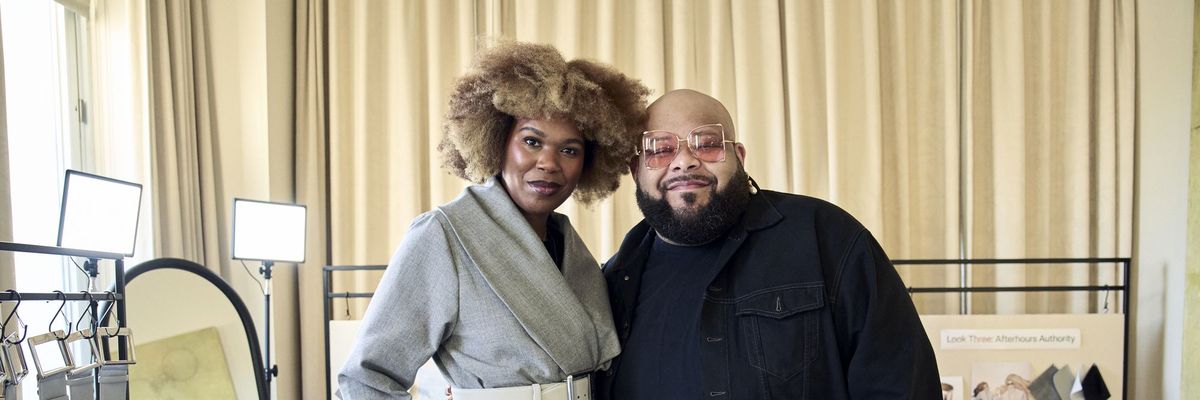It's Time To Start Taking Low Iron Levels Seriously, So We Asked A ‘Blood Doctor’ How To Do It

I can still remember the look on my doctor’s face when he read back my hemoglobin levels after taking routine blood work.
“You should be in the hospital right now,” he said with a look of concern on his face. Unaware of the weakened state that my body was in at the time, I was confused by his reaction. “Your hemoglobin levels are at 7gm/dL,” he told me.
“And what are the normal levels?” I asked him, now with equal concern. “For women, normal levels are between 12.3 gm/dL and 15.3 gm/dL.”
It was at that moment that I realized that there was nothing “normal” about my perpetual fatigue and low energy levels — as they all pointed back to one thing: my anemia.
It wasn’t long after my appointment that I started on iron transfusions, and over the four sessions, it felt like I was given an entirely new body. One with more energy, better sleep patterns, less intense periods, and no more fatigue. The surge in energy made me wonder why I went so long to make my anemia a top health priority. What would've happened had I not gone in for the routine check-up sooner?
@andreadeanmd Take iron deficiency seriously. It can affect your quality of life. #irondeficiency #irondeficiencyanemia #lowhemoglobin #anemiaproblems #anemiasymptoms #blackwomenoftiktok #hispanictiktok #tiktocdocs
What Is Anemia and Its Symptoms
Iron deficiency anemia (IDA) is a medical condition characterized when the body lacks enough iron to produce all of the hemoglobin necessary for healthy red blood cells (RBCs). Hemoglobin is a protein in red blood cells that helps carry oxygen from the lungs to the rest of the body.
Because we need oxygen to regulate proper blood flow, individuals with anemia can find themselves experiencing irregular heart rates and extreme fatigue, which can lead to serious health complications if left unchecked.
Other symptoms of anemia include:
- Cold extremities
- Weakness
- Pica, or the desire to eat non-nutritional foods like clay or ice
- Dizziness
- Hair loss
- Brittle nails
- Brain fog
- Shortness of breath
- Restless leg syndrome
There are several types of anemia, each with different underlying causes, such as nutritional deficiencies in iron, vitamin B12, or folic acid deficiency, chronic diseases like blood loss from injuries or medical conditions, or genetic factors like sickle cell anemia.
Anemia and Black Women
While having anemia at times gets overlooked as a serious health condition or even reduced down to “always being cold” and eating ice, it’s important for those living with anemia to understand the causes and long-term effects of this condition.
Studies show that “anemia in Black women and Hispanic women occurs 2 to 3 times more often than in Caucasian women.” While it is still unknown why women of color have a higher occurrence of iron-deficiency anemia, key factors that cause anemia, such as your body’s inability to absorb iron and low intake of essential nutrients like vitamin B12 and B9, should be taken with a great amount of care and consideration as you prioritize your health and well-being.
That’s why we’ve tapped Hematologist/Oncologist of Hematology Connect Andrea R. Dean, MD, to provide us with insight on how to manage and treat our anemia because it’s a condition worth taking seriously.
xoNecole: Are there genetic factors that make Black women more susceptible to anemia?
Dr. Dean: Black women are more susceptible to anemia due to iron deficiency, which is most prevalent in this group. Iron deficiency is commonly due to heavy menstrual bleeding from fibroids. Black women have a greater lifetime incidence of fibroids than any other group of women. This likely has a genetic component, but more research is needed.
xoN: Iron pills are commonly recommended to aid in low iron. From your expertise, what are some other supplements or treatments that can help manage anemia?
Dr. Dean: Treatment for anemia depends on the underlying cause. If anemia is due to B12 deficiency or folate deficiency, replacement of these vitamins is needed. If anemia is due to gastrointestinal bleeding, a referral for an EGD and colonoscopy is needed to locate the source of [the bleeding] and stop it. If anemia is due to iron deficiency, you can take iron pills, liquid iron solution, or intravenous iron.
xoN: What dietary changes can someone make to improve their iron intake and absorption?
Dr. Dean: You can eat green leafy vegetables and red meats to increase iron in your diet. If taking iron pills, absorption is better when taken in the morning on an empty stomach every other day.
xoN: At times, anemia and low iron can be overlooked as a health concern, but what are the potential long-term consequences of untreated or chronic anemia in Black women?
Dr. Dean: Untreated anemia can be detrimental to your health. Your hemoglobin carries oxygen to organs throughout your body. If you are anemic or your hemoglobin is low, your organs are not receiving the oxygen they need to properly function. You can pass out from being anemic, and low hemoglobin stresses your heart muscles, and some patients can experience a heart attack. Additionally, the symptoms from anemia can be debilitating and can decrease your quality of life.
xoN: Can low iron be permanently corrected, or does it have to be managed throughout one’s life?
Dr. Dean: The underlying cause of iron deficiency will determine whether it can be corrected. If iron deficiency is due to decreased absorption from H. pylori, once the bacteria infection is treated, iron deficiency should resolve. If iron deficiency is due to heavy menstrual bleeding, it will likely have to be managed until a woman enters menopause unless she seeks treatment to stop or slow down periods. If iron deficiency is due to gastrointestinal bleeding, it might have to be managed throughout one’s life if they have arterial venous malformations.
Let’s make things inbox official! Sign up for the xoNecole newsletter for daily love, wellness, career, and exclusive content delivered straight to your inbox.
Featured image by Goodboy Picture Company/Getty Images
This Is How To Keep 'Holiday Season Stress' From Infecting Your Relationship
Hmph. Maybe it’s just me, but it seems like there is something really weird happening in the fall season air (because winter doesn’t officially begin until December 21) that cuddle season is in full swing while break-up season is as well. In fact, did you know that break-ups are so popular during the holiday season that December 11 is deemed Break-Up Day?
The reasons why relationships shift around this time vary; however, I did both roll my eyes and chuckle when I read that a very popular one is because it’s an easy way to get out of getting one’s significant other a Christmas present. SMDH.
Anyway, I personally think that the less shallow folks out here may contemplate calling things “quits” or they at least distance themselves a bit from their partner (and what I’m referring to is serious relationships) due to all of the stress and strain that oftentimes comes with the holidays whether it be financial, familial, due to their tight schedules or something else.
Listen, I would hate for you and your man to miss the fun and happiness of experiencing this time of year, all because you are so overwhelmed or irritated that you can’t really enjoy it. That’s why I have a few practical tips for how to avoid allowing the typical holiday season stress from INFECTING your relationship.
Manage Your Expectations
 Giphy
GiphyUnmanaged expectations. If there is a main reason why the holiday season tends to be so stress-filled for so many people, I’d bet good money that this is the cause. And when you’re in a long-term relationship, expectations can manifest themselves in all sorts of cryptic and/or unexpected ways. You might have relatives who assume that you are going to be with them for Thanksgiving or Christmas when you have other plans in mind. You might be thinking that you are going to spend one amount for presents while your man is thinking something totally different. When it comes to scheduling, your signals may be crossed.
And you know what? To all of these scenarios, this is where clear and consistent communication come in. Don’t assume anything. Don’t dictate anything either. From now until New Year’s, mutually decide to check in once a week, just to make sure that you are both on the same page as it relates to the holidays and what you both are thinking will come along with it. The less blindsided you both feel, the less stressed out you will be. Trust me on this.
Set (and Keep) a Budget
 Giphy
GiphyOkay, so I read that last year, 36 percent of Americans incurred some type of holiday-related debt. Hmph. Last year, there was still some sense of normalcy in this country, chile, so I can only imagine what finances are gonna look like over the next several weeks. That said, since I don’t know a lot of people who don’t find being broke stressful, make sure that you and your bae set a budget and then stick to it this year — no ifs, ands or buts.
Because really, y’all — it doesn’t make sense to deplete savings and/or max out credit cards for a few days of giggles only to be damn near losing your mind because you don’t know how to make ends meet come Dr. Martin Luther King, Jr. Day.
And by the way, this tip doesn’t just speak to things like food and gifts; I also mean travel. If it doesn’t make a ton of sense (or cents) to be all over the place this year — DON’T BE.
Keep Matthew 5:37 at the Forefront
 Giphy
GiphyIf off the top of your head, you don’t know what Matthew 5:37 says, no worries, here ya go: “But let your ‘Yes’ be ‘Yes,’ and your ‘No,’ ‘No.’ For whatever is more than these is from the evil one.” That verse right there? Oh, it’s a boundaries lifesaver! I say that because do you see “maybe” or “I’ll think about it” in there? Nope. LOL. It says that you should tell people “yes” or “no” and leave it at that — and that complements Anne Lamott’s quote, “’No’ is a complete sentence” impeccably well. Yeah, you’ve got to remember that anything beyond a yes or no to a request is privileged information; you don’t owe anyone details or an explanation.
Besides, if you are really honest with yourself, when someone asks you something and you give a “Umm, let me think about it” kind of reply, more times than not, you already know what your answer is going to be — so why not let you both off of the hook? Give your response. Commit to that. And let everyone (including yourself) get on with their lives and schedules.
I promise you that when it comes to those holiday parties, you are pissing more folks off by not RSVP’ing or doing so and not showing up than just saying, “Thank you but not this year” off the rip.
Remember That Your Personal Space Is Privilege Not a Right
 Giphy
GiphyA friend of mine recently bought a new house and invited me over to come see it. He’s a single man with no children, so as I was taking in all of the space that he had, especially as I walked through his finished basement, I joked about relatives coming to live with him. “Hell no” and “absolutely not” were pretty much his immediate responses as he went on to say that some folks even had the nerve to be offended when he told them that he had no intentions on taking DNA in.
Ain’t it wild how people think that your stuff is their right? And yes, that brings me to my next point. Your home is your sanctuary space. If you want to host folks this year — cool. If not, ALSO COOL. Please don’t let folks (family included) guilt you into how they want you to act or even into what they would do if the shoe was on the other foot. You are not them — and as one of my favorite quotes states, “If two people were exactly alike, one of them would be unnecessary.” (A man by the name Larry Dixon said that.)
Hell, my friends? They know that I am good for sending them random things that they need or even want all throughout the year. Coming over to hang out at my pace, though. Uh-uh. Chalk it up to being a card-carrying member of the ambivert club yet I like keeping my living space personal — and I sleep like a baby, each and every night, for feeling that way.
Always remember that your space, your time, your resources, your energy and shoot, yourself period (including your relationship), are all things that are your own. You get to choose how, when and why you want to share them. The holiday season is certainly no exception.
Cultivate Some “You Two Only” Traditions
 Giphy
GiphyIt’s not uncommon for some couples to hit me up after the holiday season to “detox.” Sometimes it’s due to the financial drama (and sometimes trauma) that they experienced. Sometimes it’s because they allowed their relatives (especially in-laws) to get more into their personal business than they should’ve. More than anything, though, it tends to be because they didn’t get enough quality time together and so ended up feeling “disconnected.”
Please don’t let that happen. Listen, I’m not even a holidays kind of woman and yet, I will absolutely sit myself down with some hot chocolate and chocolate chip cookies to enjoy a Hallmark holiday film or two. Aside from the fact that most of them are lighthearted and sweet, I also like that they usually focus on couples loving on each other amidst all of the holiday beauty and ambiance — which is something that all couples should set aside some time to do.
Maybe it’s a vacation. Maybe it’s a staycation. Or maybe it’s my personal favorite, A SEXCATION. Whether it’s for a few days, the weekend or even overnight — don’t you let the holidays go by without setting aside time for you and your man to celebrate one another. Don’t you dare (check out “Are You Ready To Have Some Very Merry 'Christmas Sex'?”).
GET. SOME. REST.
 Giphy
GiphyI once read that 8 out of 10 people get stressed out over the holidays and 3 out of 10 lose sleep during to it — and when you’re stress-filled and sleep-deprived, that can absolutely lead to hypersensitivity, making mountains out of molehills and even not being in the mood for sex.
Your relationship can’t afford to go through any of this, so definitely make sure to prioritize rest. I don’t care how unrealistic it might seem during this time, sleep should never be seen as a luxury; it will always and forever be a great necessity.
That said, try to get no less than six hours of shut-eye in (check out “6 Fascinating Ways Sex And Sleep Definitely Go Hand In Hand”) and even ask your bae to take a nap with you sometimes (check out “Wanna Have Some Next-Level Sex? Take A Nap, Sis.”). Not only will sleep help to restore your mind, body and spirit but, when it’s with your partner, it’s an act of intimacy that can make you both feel super connected, even in the midst of what might feel like chaos.
___
Holiday season stress is real. Still, never give it the permission or power to throw your relationship off. Put you and your man first and let the holidays be what they are gonna be, chile.
Let’s make things inbox official! Sign up for the xoNecole newsletter for love, wellness, career, and exclusive content delivered straight to your inbox.
Featured image by Shutterstock
Sergio Hudson On Designing With Intention And Who Gets Left Out Of The Industry
Sergio Hudson dreamt big as a young South Carolina boy staring out of the window of his mom’s Volvo driving down the Ridgeway, South Carolina streets. Those dreams led him to design opulent tailoring that’s been worn by Beyoncé, Queen Latifah, former Vice President Kamala Harris and Forever First Lady Michelle Obama, just to name a few.
Those dreams have come full circle in a new way as he recently collaborated with Volvo for a mini capsule collection suitable for chic and stylish moments this fall. The 40-year-old designer follows a long legacy of fashion aficionados who’ve used their innovation to push the automotive industry forward, including Virgil Abloh, Eddie Bauer, Paul Smith and Jeremy Scott.
Using the same material from the interior of the Volvo EX90, Hudson crafted a wool-blend car coat and waistbelt that combine the vehicle’s Scandinavian design with his signature tailoring and intention. The exclusive collection launched on October 20, and each piece is made-to-order by Sergio Hudson Collections.

Courtesy
In October, I traveled to Charleston with a group of journalists to get a firsthand look at Hudson and Volvo’s location. During a fitting, Hudson said his goal is to make “great work that can stand the test of time.”
“People can look back on and say, ‘I remember when Sergio did that collaboration with Volvo,’” he continued. “Thinking about aligning yourself with classic brands that speak to where you want to go. And I think that's what this collaboration kind of means to me and my business.”
Hudson pinpoints his mom as the biggest influence for his designs. This collaboration was no different.
“This particular coat reminded me of the swing coats that my mom used to wear in the early 90s. You know, diva girls in the early 90s had Sandra suits,” he said, referring to Jackée Harry’s character in 227. “My mom wore those and she would have these matching swing coats to go over them. And that's where the initial idea came. This would be around the same time that we had our Volvo. So she would put on her suit, her swing coat, get in that red Volvo, and go to church.”

Courtesy
With this capsule and beyond, Hudson wants to see more staples rotating in and out of closets this fall. He advises fashionistas to build her closet out with essentials to mix and match that aren’t just stylish but also sustainable.
“It's just those special pieces,” he said. “You can wear the same shirt and pants every day and nobody will notice. But if you have a special boot, a special coat, a special bill, a special bag, that kind of speaks to everything that your style stands about, that is something you should focus on.”
These are the same kind of staple pieces that return to our Pinterest boards and TikTok feeds season after season. Fast fashion has never been Hudson’s aim. “I'm trying to create a special pieces that can stand the test of time,” he said in his warm, Southern accent. “I'm only creating those kind of pieces from here on out.”

Courtesy
For Hudson, this collaboration is revolutionary. It’s his first time working with a car company and experimenting outside of his wheelhouse in this way.
“This is a Scandinavian brand, and, you know, it's 70 years old. I'm an African-American boy from South Carolina that has had a brand for 10 years. So I think bridging those two worlds and seeing the similarities was the beauty of this project,” he explained.
Though Hudson and his partner and CEO of Sergio Hudson Collections Inga Beckham have made massive strides in just 10 years, Hudson said the industry is far from where he wants to see it when it comes to Black representation. He pointed to how few Black designers were at this year’s Met Gala despite the theme being Black dandyism.
“The fact that I dressed 18 people speaks to how many of us weren't there,” he said. He implored more of industries, fashion and beyond, to collaborate with Black designers often.
“Allow mentorship. Allow funding. Allow great design to shine through,” he implored. “When it comes to being a designer of African descent, when you can't get the funding that your counterparts have, you can't compete. When you get opportunities like doing a collaboration with Volvo, or you get opportunities to be at the Met Gala, that's putting us on the equal playing field, but really the funding behind it is what we need to take it to that desk level.”
Featured image courtesy









